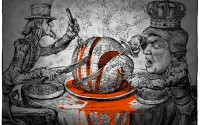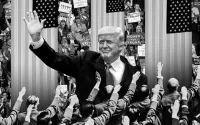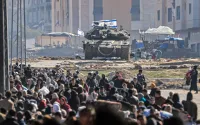26 April 2002The GuardianIs Saudi Arabia willing to play the "oil card"? On Wednesday, the day before his summit meeting with President Bush, Crown Prince Abdullah made it known that the Saudi royal family could no longer rule out using oil as a weapon if the US did not moderate its support for Israeli military policies. Saudi Arabia's leader is worried that an absolute refusal to consider using oil as a bargaining ploy could play into the hands of Islamists, with dire consequences for the Saudi regime and other moderate governments in the Middle East. The crown prince's views will send shivers through markets in the west, which fear a repeat of 1973, when the Arab oil-producing countries in the Middle East rocked the postwar global order. Those markets had been reassured by a statement last week by Saudi Arabia's foreign minister, Prince Saud al-Faisal, that his country would not use oil as a weapon against Israel and the US. But suddenly all bets are off. The crown prince was responding to an appeal by Iraq, Iran and Libya for Arab countries to implement an oil embargo to protest against Israel's "war of aggression" against the Palestinians. In early April, Iraq - which exports 4% of all the oil traded on world markets - suspended the export of all of its oil for 30 days in response to the Israeli incursion into Palestinian territories. "Oil isn't a weapon like a cannon or a tank," the Saudi foreign minister had argued. It remains to be seen whether Crown Prince Abdullah will agree. Needless to say, political leaders do not want to repeat 1973, when Opec first used oil as a weapon against Israel, the US and their allies. The Opec oil embargo - which came on the heels of the Yom Kippur war between Israel and its Arab neighbours, Egypt and Syria - led to oil prices quadrupling, motorists waiting in long queues at petrol stations, and the global economy beginning a slide into prolonged recession. Up to now, the prevailing wisdom on Wall Street has been that there was "a very low possibility" that Arab oil producers would cut supplies. This may, however, be wishful thinking. What no one seems to be taking into account is how powerless and desperate millions of Arabs are likely to feel in the months ahead if the violence between Israel and the Palestinians continues. The bottom line is that the oil card may be the only weapon open to the Arab world. If the collective rage of the Muslim world boils over, look for young Muslims to take to the streets in large numbers, as they already have in Iraq, chanting "Arab oil for the Arabs". The public pressure to use oil as a weapon against Israel, the US and the west might be too politically charged for Saudi Arabia and other Gulf governments to ignore. The fact is, many younger Muslim fundamentalists view oil as "a soft loan from Allah". Radical Islamists like to point out that 10 of the 11 Opec nations, plus Oman, Bahrain, Syria, Egypt, Brunei, Tunisia and Malaysia, are Muslim states. At the centre of oil and Islam is Saudi Arabia, which holds the largest oil reserves in the world and is the holy land of Islam - the birthplace of the prophet Mohammed and gatekeeper of the sacred Muslim shrines of Mecca and Medina. While hardened geopolitical analysts in the west chuckle at the idea that Allah bestowed such a gift on the upholders of the faith, no one dares laugh when Osama bin Laden urges his followers around the world to reclaim the Saudi holy land, establish a universal Islamic state, and raise the price of oil to $144 a barrel. The story of oil gives credence to the idea that "what goes around comes around" in history. Oil, the energy source that helped make the west the unchallenged economic, political and cultural force in the world, could now be its undoing at the hands of an Islamic world determined to restore its former status as the world's spiritual and cultural arbiter. Oil and Islam are inseparably linked. The fate of one will, to a great extent, determine the fate of the other in the coming century. Oil is increasingly viewed by a younger generation of Muslims as the "great equaliser", a spiritual as well as geopolitical weapon that can lead to the second coming of Islam. King Fahd of Saudi Arabia sensed as much in the aftermath of the oil shock of the 1970s and early 1980s, and he told his fellow Muslims: "The main resource to depend upon after God is oil." But if the Arab countries do decide to play the oil card, the hardest hit would be the developing countries. In the aftermath of the 1973 embargo, countries in the developing world were forced to seek loans from western banks, the World Bank and the International Monetary Fund to pay for the increased cost of oil imports. Commercial bank loans to the developing world increased by 550% between 1973 and 1980. The second peak in Opec oil prices in 1979 triggered a global recession and a collapse of commodity prices, further weakening already debt-ridden developing countries. By 1985, debt in the developing world exceeded $1 trillion, causing nations to slip further into poverty. Today, developing countries are even more dependent on oil imports: for their expanding manufacturing sector; for light and heat for an increasingly urban population; and for fuel for their growing transportation needs. In the 1970s, developing countries accounted for 26% of total world oil demand. Today their share tops 40%. Brazil's oil import bill was 150% higher in 2000 than in the previous year. Kofi Annan, the UN secretary general, recently warned that for most developing countries "debt-servicing costs are likely to increase if higher oil prices lead to higher international interest rates" in the years ahead. A new oil embargo then - especially over an extended period - could plunge developing countries into an economic abyss from which they might not be able to recover. For many militant Muslims, who have experienced only a sense of defeat and humiliation at the hands of the western powers for most of the 20th century, the prospect of controlling the pipeline to the largest remaining crude oil reserves in the world is a chance to square accounts. For the western powers, the energy companies, the global business community and consumers, the very thought that countries in the Gulf might once again use oil as a weapon to impose their will on the world stage is frightening. For many developing countries, the prospect of an oil embargo and a dramatic rise in its price is tantamount to a death sentence for their already beleaguered economies. · Jeremy Rifkin's The Hydrogen Economy: The Creation of the Worldwide Energy Web and the Redistribution of Power on Earth will be published in September by Polity Press. He is president of the Foundation on Economic Trends in Washington DC.
Açık Gazete'nin yıl boyunca sunduğu haberlerden öne çıkan derlemeler
Kâinatın tüm seslerine, renklerine, titreşimlerine Açık Radyo...
İletişim
Açık Medya Yayıncılık A.Ş.
Koltukçular Çıkmazı No 7 İç Kapı No 2
Tophane, Beyoğlu, İstanbul, TR-34425
Telefon: +90 212 343 4040
Faks: +90 212 232 3219
E-posta: [email protected]






